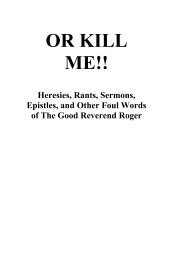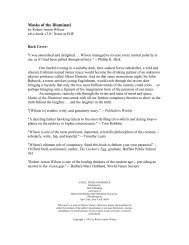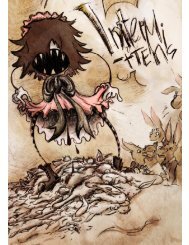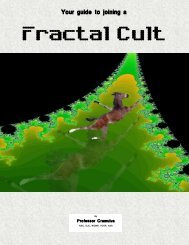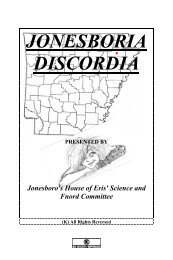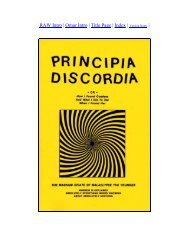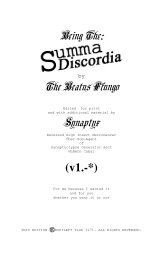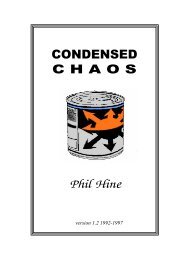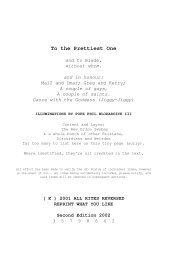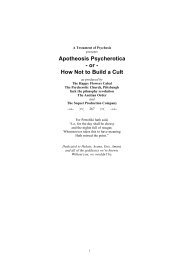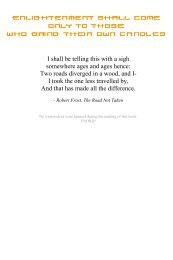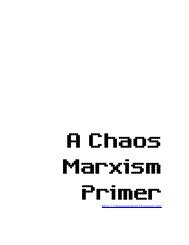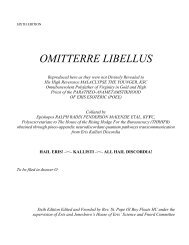Coincidance - Principia Discordia
Coincidance - Principia Discordia
Coincidance - Principia Discordia
Create successful ePaper yourself
Turn your PDF publications into a flip-book with our unique Google optimized e-Paper software.
COINCIDANCE 59<br />
working within the monotheistic patriarchy of Islam, could not emulate<br />
this, but made her an angel communicating between Allah and man. The<br />
witch covens made her the great mother goddess. Aleister Crowley's secret<br />
teachings, in our own century, instructed his pupils to envision her as the<br />
Egyptian star-goddess, Nuit.<br />
When anthropologist Weston La Barre says, "Mothers make magicians;<br />
fathers, gods," he means that the magic or shamanistic trance is a return to<br />
the bliss at the breast of the all-giving mother, while religion is an anal<br />
propitiation of a fearful god who is an enlarged portrait of the punishing<br />
father. These distinctions do not always remain sharp—Tantra managed to<br />
get incorporated into the patrist framework of Hinduism, and Sufi sexmagic<br />
into the equally patrist Moslem faith of Allah. In the West, however,<br />
patriarchy became extreme; Jehovah would bode no rivals, least of all a<br />
goddess equal to himself, and the magic-matriarchal-oral cults were driven<br />
underground, masqueraded as pseudo-sciences like alchemy, or came forth<br />
only in the form of poetry. Even so, patriarchy is so nervous of rivals in the<br />
West that the poet has come under considerable suspicion at many times, is<br />
often thought to be "queer" in one sense or another and, in the most anal<br />
cultures, often seems to be deliberately ignored or starved into submission.<br />
(If he is kind enough to die young, he is then forgiven and becomes a kind of<br />
secular Christ or martyr, as in the Dylan Thomas cult.) In England, the<br />
prejudice is so bad, Robert Graves notes in The White Goddess, that poets,<br />
when forced to identify themselves—on government forms or in courtrooms,<br />
say—will almost always use such terms as "teacher," "novelist," "historian"<br />
or whatever else they happen to be besides poets.<br />
In Mammon and the Black Goddess, Graves nicely summarizes the relationship<br />
between poetry and the old oral cults of magic and matriarchy:<br />
The poet is, on the whole, anti-authoritarian, agoraphobic and intuitive<br />
rather than intellectual; but his judgments are coherent. Symptoms of the<br />
trance in which poetic composition occurs differ greatly from those of an<br />
induced mediumistic trance; though both seem directed by an external<br />
power. In a poetic trance, which happens no more predictably than a<br />
migraine or an epileptic fit, this power is traditionally identified with the<br />
ancient Muse-goddess. . . .<br />
Almost every poet has a personal Muse, a relationship first introduced<br />
into Europe from Sufi sources in Persia and Arabia during the early Middle<br />
Ages.<br />
Poetry and magic, then, are based on a belief that thought can create its<br />
own reality—which Sir James Frazer in The Golden Bough called the theory of<br />
"the omnipotence of thought" and which Freud, in his comment on Frazer's<br />
anthropological investigations in Totem and Taboo, traced back to the child's



